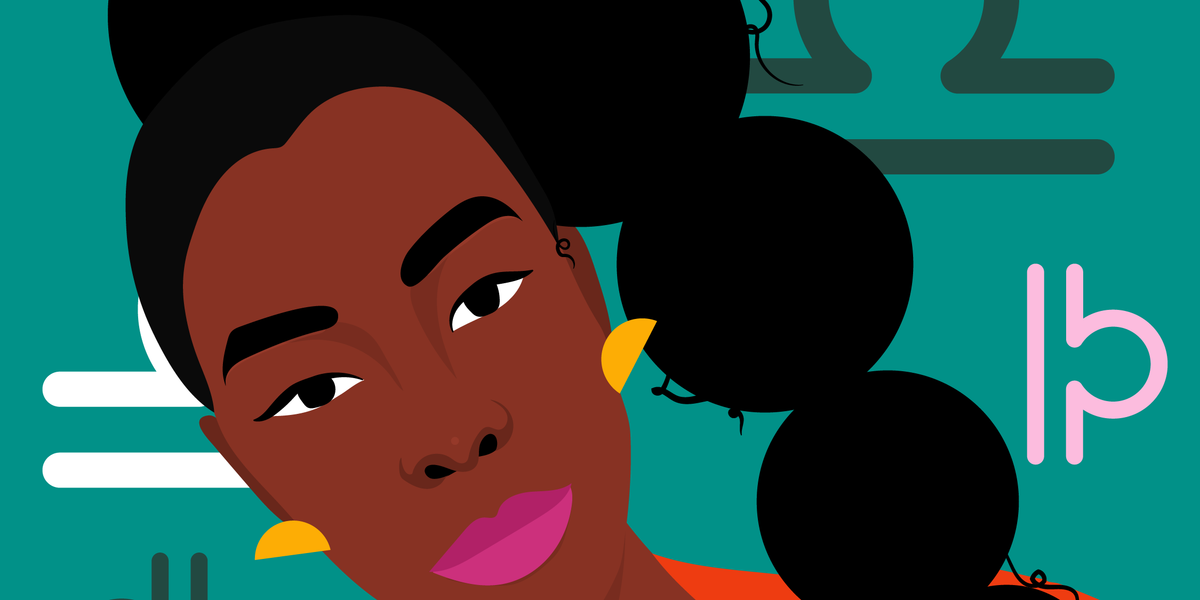
I didn’t know I had a mother wound until my therapist named it for me.
I had been describing a pattern of emotional unavailability in my choice of partners as a commonality between them. I told him how there was often a physical presence but also one paired with an emotional distance. I expressed that I felt inclined to be the "reasonable" one in my relationships. Easy to love, eager to please, emotionally contained. He gently gave me language, but some I wasn’t expecting: “It sounds like a mother wound.” That statement helped me connect so many dots, but at the same time, I asked him, "But, how?"
My mother is there for me. My mother is a home for me. My mother loves me. What I learned was that a mother wound doesn’t always have to come from abuse, neglect, or other forms of toxicity. Sometimes it comes from a very human mother who is doing her best in all of the ways you could ever ask her to and even in ways you couldn’t, but one who is also emotionally unavailable, overly critical, or dependent on you to meet her needs. (Parentification, party of one.)
My mother wound took form not because she was unloving, but because she was often emotionally unavailable. As a single mother of three and a mother to countless others working in education, she carried the weight of everything. And while I’ve always admired her strength and loved her deeply, I now understand that some of my emotional patterns were shaped by the love I craved but didn’t always feel. She is an amazing mother, and I still have a mother wound. I hold space for both truths because they both deserve space.
If you’ve ever struggled with the ability to self-soothe, people-pleasing, low self-worth, or emotional boundaries, your mother wound may still be calling the shots in your life and your adult relationships. To learn more about what the mother wound is, how it shows up, and how to start healing it, keep reading.
What Is a Mother Wound?
A mother wound refers to the behavioral patterns, emotional pain, and belief systems derived from the relationships we have with our mothers or maternal figures. It's an attachment wound that is not always caused by overt harm. Sometimes mother wounds stem from emotional absence or a lack of emotional support, criticism, passive-aggression, control, co-dependency, or a feeling that you had to earn love by being self-sacrificing or self-sufficient, "easy," or helpful.
The wound is less about pointing fingers at who to blame and more about having awareness around where your needs were left unmet, and how that impacted the way you show up in the world.
Trauma Integration Coach Ally described the impact of such a wound perfectly. In an Instagram caption, she wrote, "When there has been mother wounding, the heart defends itself and tries to close. Our whole system lives in a state of contraction and unsafety, depleted of love, nurturance, and connection."
That "state of contraction and unsafety" she refers to can look like:
- Feeling emotionally guarded, even with people you love
- Struggling to trust your needs or believe you’re allowed to take up space
- Over-functioning in relationships or assuming the role of caregiver/fixer
- Having chronically anxious or hyper-independent nervous system states (i.e., never letting yourself rest or receive)
While these patterns are often unconscious, they have the potential to quietly shape everything, from your self-worth to your romantic relationships.
The Types of Mother Wounds
5 Types of Mother Wounds You Should Know About
While everyone's experience is unique to them, some types of mother wounds show up more commonly than others. According to The Mother Wound Project, there are seven types of mother wounds, but I've also seen sources that say they are as many as 15. Because mother wounds are complex and can originate from different behaviors experienced in a mother-child relationship, it is possible to have multiple types of mother wounds depending on the parent.
To begin healing your mother wound(s), it is helpful to identify the type of mother wound you may be carrying and how it might be playing out in your life today. Check out a few of the more common ones below.
The Abandonment Wound
If your mother was physically or emotionally unavailable, or even absent from your life altogether, you might have an abandonment wound. Perhaps she worked a lot, struggled with her own mental health, or was unable to attune to your emotional needs. As a result, you might have felt unheard, unseen, or like your feelings weren't important.
How it manifests:
- Attracting unavailable or avoidant partners
- Struggling to ask for help or trust others
- Having a fear of rejection, or like you're "too much"
The Criticism Wound
If your mother had impossibly high expectations for you, was overly critical, or was a perfectionist who wanted you to follow suit, it's possible you internalized a harsh inner critic. Love might have felt conditional, like it had to be earned through success by way of accomplishments, accolades, and achievements, or through being compliant, easy, or needless.
How it manifests:
- Feeling like you're not "doing enough," not now, not ever
- Struggling with impostor syndrome or chronic self-doubt
- Fearing you might make the "wrong" choice, or that you'll fail
The Enmeshment Wound
For many with mother wounds, it’s not just about what was lacking or missing, but instead how closely they were tied to their mother’s emotional world. This is where emotional enmeshment enters the chat. This can look like little to no emotional separation between you and your mother, where boundaries between the two of you become so blurred that you don't know where her needs and feelings end and where yours begin.
If you felt responsible for your mother’s mood, well-being, comfort, or approval as a child, you might have an enmeshment wound.
How it manifests:
- Feeling guilty when setting boundaries
- People-pleasing in relationships or anxious attachment
- Difficulty when deciphering what it is you want in life (Read: "Living Your Best Life Actually Looks Like Decentering Your Mother")
The Emotional Neglect Wound
A quieter wound, but felt nonetheless. An emotional neglect wound develops when your emotional needs are constantly overlooked, minimized, or rarely fully acknowledged. Your mother might have been there physically or provided for you through material things, but she rarely asked you how you felt, let alone validated your emotions or created space for vulnerability.
How it manifests:
- Feeling like your feelings are a burden instead of a gift
- Difficulty expressing your emotions or naming them
- Feelings of emptiness or disconnection even in close relationships
The Invalidation Wound
If you grew up feeling like your experiences, perceptions, or feelings were belittled, you're not alone. You're one of many with an invalidation wound. This type of wound originates from having your reality dismissed or constantly questioned. Your feelings could have been labeled as "dramatic," your truths might have been denied or invalidated, and your experiences might have been minimized.
With time, this behavioral pattern impacts you by causing deep confusion around what you believe you are "allowed" to feel and your overall sense of self.
How it manifests:
- Struggling with conflict or trusting your voice
- Second-guessing your instincts or questioning your reality
- Feeling gaslit even in safe relationships
How to Heal Your Mother Wound
As previously mentioned, healing a mother wound is not about blaming your mother, it’s about tending to the parts of you that didn’t get what they needed way back when. It’s about creating emotional safety, clarity, and self-connection, often for the first time. And you don't need anyone's permission to do it, just the courage to start. Here’s where to begin:
1. Acknowledge what you needed but didn't get: You're allowed to name the emotional gaps that were and are still very real for you. And you're allowed to do so without guilt. Awareness is the first step in the healing and reclamation of your voice.
2. Self-parent yourself: Speak to yourself with the softness, nurturance, love, and validation you once craved. You can affirm yourself, you can meet your needs, you can reparent your inner child. You can remind yourself that you have the power and you can choose how to go about wielding it. Self-mothering is one of the ways to do this.
3. Set compassionate boundaries: You don't have to cut your mother out of your life if you don't feel called to, but it's important to remember that setting boundaries is about protecting your peace, not punishing your mother. If you need to create some space while choosing peace over performance, do that. And do so with compassion.
4. Hold your grief without shame: Even if your mother did her best, you're allowed to grieve the mother you wished you had. Honor that loss as the act of liberation it is.
5. Redefine what mothering looks like to you: Yes, you're every woman, and it's all in you, but we weren't born to do life alone, hence the need for love and connection. If your mother can't meet those needs, open yourself up to receiving love from other places and sources.
Let yourself be nurtured by friendships, chosen family, therapy, and nature. You're worth it.
Let’s make things inbox official! Sign up for the xoNecole newsletter for love, wellness, career, and exclusive content delivered straight to your inbox.
Featured image by Shutterstock
Your October 2025 Monthly Horoscopes Are All About Magnetic Love & Divine Timing
October is about the power of attraction. This is the month to set your intentions, create space for a new beginning, and find your balance between the past, present, and future. There aren’t many astrological transits this month, signaling more possibilities in the air and an opportunity to create that which you desire.
We begin the month in Libra Season, and Libra Season is always the time of year when love is the highlight. With Juno also entering Sagittarius on October 1, right as we begin the month, it’s about committing yourself to a new adventure, to the gifts of love, and to perspectives that heal and bring you closer to another.
October 2025 Astrology: An Overview
Mercury enters Scorpio on October 6, and Mercury in Scorpio only knows depth. The conversations being had this month are inspiring, transformative, and a little more blunt than usual. This energy is good for the power of persuasion and for asking for what you want, especially within business and financial matters. On the same day, we have a Supermoon in Aries, and this is a powerful Full Moon for reflection, owning your power, and letting go of the insecurities that don’t resonate with what you want for yourself and your future.
Venus, the planet of love, moves into Libra on October 13 after being in Virgo for the past month, and after some time of healing and clarity in love, Libra is here to bring in the romance. Venus loves being in Libra, and this energy creates new beginnings within relationships and provides a little extra magic in this area of life. With Pluto going direct in Aquarius on the same day after being retrograde since May, life and love move forward mid-October, helping provide more stable and nurturing foundations in your personal life and community as well.
The New Moon of the month occurs in Libra on October 21, making it a beautiful time for manifesting romance, balance, and harmony in your world.
This New Moon aligns with the Sun in Libra, and it’s all about letting a new beginning transform your world and the love in your life for the better. Scorpio Season officially begins on October 22, and Neptune retrograde enters Pisces on the same day, bringing in some water sign energy into the mix. As we close out the month, it’s time to renew, honor the transformations occurring, and know that your dreams aren’t as far out of reach as they may seem at times.
Read for your sun and rising sign below to see what October 2025 has in store for you.
What October 2025 Has In Store For Your Zodiac Sign
ARIES
 AriesKyra Jay for xoNecole
AriesKyra Jay for xoNecoleOctober is all about perspective, Aries. This is the month to trust the divine timing of your life, and not let the what-ifs overwhelm you. With the Sun in Libra, your sister sign, for most of the month, October is about building connections, finding your balance in love, and knowing that you are worthy of what your heart is seeking right now. We have a Supermoon in your sign on October 6, and emotions are a little heavier this month, but also healing. Give yourself grace, and let go of what isn’t working for you.
Venus is in your house of love from October 13 until November 6, and there is a lot to look forward to when it comes to romance and the relationship dynamics in your life as you move through the month. It’s about being confident in your power of attraction and letting love come to you right now. Before October comes to an end, we have a New Moon in your 7th house of love as well, and with all this energy in your relationship zone, life changes for you in love for the better in October.
TAURUS
 TaurusKyra Jay for xoNecole
TaurusKyra Jay for xoNecoleOctober is a spiritual month for you, Taurus. You are thinking a lot about your next steps ahead, and are getting organized, focused, and aligned. The Supermoon on October 6 is a time of reflection for you, and you are entering the month ready to let go of the past, heal, and create space for something new in your life. This month is all about trusting your intuition and letting your wisdom guide you in your personal growth and evolution.
You are more than where you have been, and this month is a reminder of that.
With Mars in Scorpio and in your 7th house of love all month, you are motivated by the partnerships in your life right now. Your love life and relationships are where the action is for you this month, and you are honoring your passion and direction here. Venus, your planetary ruler, moves into your house of health mid-month and into November, and you are leaving October seeking healthier habits, daily routines, and relationships. Overall, this month is helping you align with your vision.
GEMINI
 GeminiKyra Jay for xoNecole
GeminiKyra Jay for xoNecoleThis month is a fresh start for you, Gemini. Your heart is free, love is beaming, and you are feeling larger than life. This month is about taking a leap of faith in yourself, honoring your confidence in life, and being your biggest advocate. With the Sun in your 5th house of self-expression, romance, and happiness, and with Venus entering this same area of your chart mid-October, there is a lot to look forward to right now, and things are looking up for you.
On October 21, we have a New Moon in a fellow air sign, and this is a good time to set your intentions for creative projects, hobbies, romance, and your overall happiness in life. There are a lot of little moments of magic unfolding for you this month, and this New Moon is one of them. Before October comes to an end, Mercury, your ruling planet, enters Sagittarius, and this brings open communication into your relationships, and you are having lively conversations and insights.
CANCER
 CancerKyra Jay for xoNecole
CancerKyra Jay for xoNecoleThis is a transformative month for you, Cancer. You are moving through closure, healing, and depth as you navigate the opportunities that are coming into your life, with the stability you are seeking. With the Sun in your 4th house of home and family in October, this is the month to spend more time in your safe spaces, connect with your loved ones, and get grounded. You are also more focused on your financial world right now, and this is a good time for building new foundations for yourself and looking at the bigger picture when it comes to your career and life goals.
Mars is in your house of romance and happiness for the entire month, and this is one of the highlights of your life right now. You are passionate about your joy and all the things that light you up inside, and you are protecting your peace and giving more of your energy to your pleasure. Before the month ends, we have a New Moon in Libra, highlighting your home life, and some Cancers may be moving at the end of the month or getting the opportunity to turn a page here. Overall, this is your month to reflect, go within, and make sense of what has been restricting you from feeling stable.
LEO
 LeoKyra Jay for xoNecole
LeoKyra Jay for xoNecoleOctober is about taking things one day at a time and being patient with what is presenting itself to you, Leo. This month, you are getting your ducks in a row and gaining the clarity needed to create a new beginning in your life. The month begins with a Supermoon in a fellow fire sign on October 6, aligning in harmony with you and fueling your need for adventure. You are going over the wisdom you have gained as of late and how it has shifted the way you navigate your life and see the world around you.
On October 13, Pluto goes direct in your 7th house of love, after being retrograde here since May. This is bringing in more balance, empowerment, and passion into your love life, and this is a positive change of energy for you after a time of some power struggles within your relationships. Before the month comes to an end, we have a New Moon in Libra, and this New Moon is the best time to set intentions for clarity, communication, and connection. October is about taking your time with things and knowing that everything is working out in your favor at the end of the day.
VIRGO
 VirgoKyra Jay for xoNecole
VirgoKyra Jay for xoNecoleThis October is about finding your balance, Virgo. There is a lot of energy when it comes to your finances this month, but you may be overworking or overcommitting yourself in the process. Honor the opportunities and responsibilities in your life, but make sure you are equally taking care of your health and prioritizing your time and energy so that you don’t burn out. Venus, the planet of love, is in your sign until October 13; use this energy to your benefit and let things come to you.
You are a magnet for abundance, romance, and support if you allow yourself to receive it.
On October 13, Venus moves into your 2nd house of income, and your relationships are a supportive place for you to lean on right now. Your love life and partnerships are where your financial world is evolving this month, and this is a good time to ask for what you want; you never know what may happen. At the end of the month, Neptune goes retrograde in your sister sign, Pisces, and you are taking a step back and reassessing what love means for you right now. Overall, October is about remembering that you don’t have to do it all alone, Virgo.
LIBRA
 LibraKyra Jay for xoNecole
LibraKyra Jay for xoNecoleLibra Season is here, and it’s your time to shine and thrive! This Libra Season changes everything for you, and October is when you really begin to feel this shift in your life. The Sun is in your sign until October 22, and it’s time to put yourself first. With a Supermoon in Aries as we begin the month as well, you are letting go of any unhealthy attachments or relationship dynamics that take you away from yourself, and are moving into deeper clarity.
On October 13, Venus, your planetary ruler, enters your sign, where it loves to be the most. With Venus in your sign for the rest of the month, love takes on a new tone, and you are feeling more love for yourself and where life is taking you right now. To end the month, we have a New Moon in Libra, and it’s time to set your intentions for where you want life to grow for you over the next year. This is a month of embarking on a new journey of self, and allowing what is inspiring you right now to build your confidence in yourself and your relationships.
SCORPIO
 ScorpioKyra Jay for xoNecole
ScorpioKyra Jay for xoNecoleOctober is about honoring your freedom and your power to decide, Scorpio. A lot is going on for you this month, and you have the passion and energy to see things through. Mercury, the planet of communication, moves into your sign at the beginning of the month on October 6, and this is going to help you get your ideas across, making it a good month for business matters, networking, and getting inspired. With Mars also in your sign for the entire month, life moves forward for you in transformative ways in October, and you are a force to be reckoned with.
On October 13, Venus moves into your house of closure, healing, and endings, and you are ready to close one chapter of love and create space for a new one. You are in a contemplative space when it comes to matters of the heart, and you are ready to let go of any heaviness you have been feeling here. Scorpio Season officially begins on October 22, and you are ready to begin again. This Scorpio Season is about owning your confidence in life while letting go of insecurities or self-doubts that have been getting in the way of that.
SAGITTARIUS
 SagittariusKyra Jay for xoNecole
SagittariusKyra Jay for xoNecoleEverything unfolds for you in a beautiful way this month, Sagittarius. You are flowing well with the energy of October, and life opens up to you. With the Sun in your 11th house of aspirations, dreams, manifestations, and community, you are feeling in balance with your desires and your reality, and are bridging the gap here. This is a month of friendship, believing in your dreams, and creating space for love. With Juno also entering your sign at the beginning of the month until the end of the year, you are attracting soulmates into your life.
On October 6, we have a Supermoon in a fellow fire sign, allowing you some closure in love and a chance at healing. Your heart is feeling renewed, and you are owning your power in creating happiness in your life. Before the month ends, Mercury moves into Sagittarius, where it will be until mid-November, and inspiration is heightened. Pay attention to the guidance you are receiving this month, the conversations you are having, and the light bulb moments that are going off for you right now.
CAPRICORN
 CapricornKyra Jay for xoNecole
CapricornKyra Jay for xoNecoleOctober is about going within and connecting with the guidance of your soul, Capricorn. You are taking more time for yourself this month, and rightly so, as you need time to fully process what has happened so far this year. Pluto goes direct in your 2nd house of income, and this moves things forward when it comes to your earning potential, abundance, and values.
The key this month is in valuing yourself, your perspective, and what you are building in your life right now.
On October 21, we have a New Moon happening in your career zone, and this is a good time to manifest your goals within your professional world. Put yourself out there, show up, and know that you are worthy of success and that your dreams aren’t too big for you. As we close out the month, Mercury moves into your house of closure, even further facilitating your desire for contemplation and alone time this month. Overall, October is about taking care of your mental health, owning your successes, and finding your peace.
AQUARIUS
 AquariusKyra Jay for xoNecole
AquariusKyra Jay for xoNecoleOctober is a new beginning for you in love and in life, Aquarius. Your heart is feeling inspired, and there is a lot to look forward to right now. The Supermoon at the beginning of the month will be occurring in your 3rd house of communication, giving you the answers you have been looking for and helping you close the door on a chapter in your life that left you feeling misunderstood or misdirected. You are ready for a change of pace this month, and you are receiving that as we begin October.
Mid-October, Pluto goes direct in your sign after being retrograde since May, and this is a huge breath of fresh air for you and your path ahead. You may have been a little harder on yourself while Pluto was retrograde this year, and now you feel ready to forgive, move on, and own your power. Before the month comes to an end, we have a New Moon in Libra, and you are embarking on a new adventure. The end of the month is a good time for traveling, exploring, and gaining a new perspective.
PISCES
 PiscesKyra Jay for xoNecole
PiscesKyra Jay for xoNecoleThis month is giving you the guidance, perspective, and passion to see yourself with clear, loving eyes, Pisces. There is a sense of feeling more overwhelmed with life lately, and October is allowing you to gain the insight needed to move on from this energy, or at least see more of the gifts of what has occurred. On October 6, we have a Supermoon in an area of your chart having to do with self-worth, values, and income, and it’s time to see the gifts of what you have been investing in and valuing in your life, including yourself.
Let go of the need to play it small or count yourself out of important conversations, and know that you deserve a seat at the table.
With Pluto going direct in your 12th house of healing as we end the month, you are finally getting the answers you have been looking for emotionally, and it’s changing your perspective on your commitments in life and making you feel empowered. Before the month ends, Neptune goes retrograde in Pisces, and you are going to be moving through a personal revolution as we close out the year. You are inspired by change right now, and this month is what kicks starts this metamorphosis within you.
Let’s make things inbox official! Sign up for the xoNecole newsletter for love, wellness, career, and exclusive content delivered straight to your inbox.
Featured image by Kyra Jay for xoNecole
It’s Silk Press Season—Here’s How To Keep Yours Sleek & Healthy
The leaves are turning. The temperatures are dropping. And you know what that means: it's silk press szn.
Getting a silk press is a treat for me. I especially enjoy how a silk press trim shapes my natural curls and makes them pop. So when I was invited to The Purple Door Salon in Atlanta (which is stunning, btw) for a silk press with master stylist and Mizani artist and educator Todd Edwards, of course, I said yes.
My hair was fresh out of braids, so my natural hair desperately needed a little TLC (and gray coverage).
Most of us have experienced a silk press or, as it was known when we were growing up: a press and curl. But the process looks a little different with natural hair because without the proper steps, you'll walk outside, and your hair will say absolutely not.
So, I want to take you through my appointment and share the tips and tricks I learned.
Expert Tips for a Flawless Silk Press
First: Detangle
Detangling from root to ends is essential before your hair meets with shampoo and H2O. And this is especially important after removing braids, or you run the risk of product and hair buildup tangling and, subsequently, causing hair loss and damage.
Edwards ran his fingers through my hair as if it wasn't a tangly mess. That's how I knew I was in good hands. He ran his fingers from the root to the ends of my hair, detangling it section by section. If finger detangling isn't your preferred method, a wide-tooth comb or Felicia Leatherwood Brush makes excellent detangling tools.
Shampoo and Condition
Now it was time for my favorite part: the shampoo. As we were shampooing, I asked if the type of shampoo and conditioner makes a difference when preparing the hair for a silk press. And the answer is yes.
"They are very important because you always want to use a shampoo and conditioner that will aid the final look or style that you're trying to achieve," Edwards tells xoNecole.
In your shampoo, you want to look for a sulfate-free option that clarifies without stripping the natural oils from your scalp that also combats frizz in preparation for thermal styling. And after a good cleanse, of course, conditioning is a must. Look for vitamin E and omega fatty acid-rich oils like argan, avocado, and jojoba-infused options.
Mizani Press Agent Smoothing Sulfate-Free Shampoo, $22
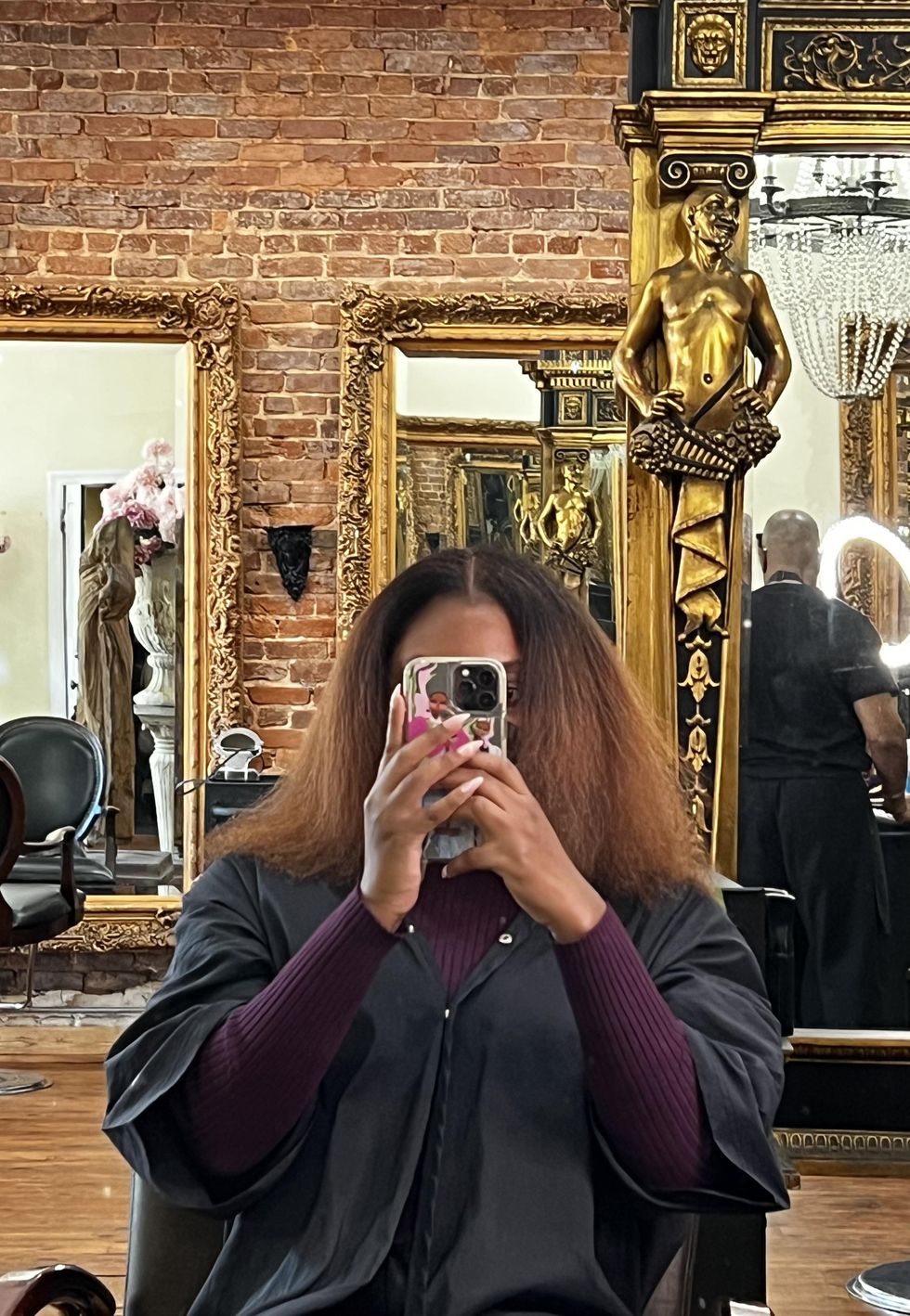
Courtesy of Bianca Lambert
The Blow Dry
Now that my hair was cleansed, and conditioned, and my grays were covered, Edwards detangled and sectioned my hair into four quadrants. Next, he went section by section, applying a leave-in conditioner and following up with a blow-dry cream. If you're ever tempted to skip your leave-in and a product to protect your hair from heat damage, don't. Here's why.
“A leave-in is the foundation to any style you are trying to achieve or create," Edwards shares. This is largely because a leave-in adds and seals in moisture, gives the hair slip for detangling and helps protect it when heat styling. Mizani's Miracle Milk Heat Protectant Leave-In Conditioner is among his favorites because it's a multitasker acting as a leave-in and heat protectant. And it's a product I never complete a wash day without because it keeps my hair nourished for days. And if my natural curls need a moisture pick-me-up, I spray a little on in the shower midweek.
In addition, he adds, "Serums and creams are essential because they protect your hair from damage caused by the heat throughout the whole silk press process from beginning to end. [And], the creams and serums will also aid in retaining moisture and sealing the cuticle." After the leave-in and blow-dry cream was layered into my curls, Edwards used a paddle brush with a blow dryer to smooth my hair from root to tip.
Mizani's Miracle Milk Heat Protectant Leave-In Conditioner, $38
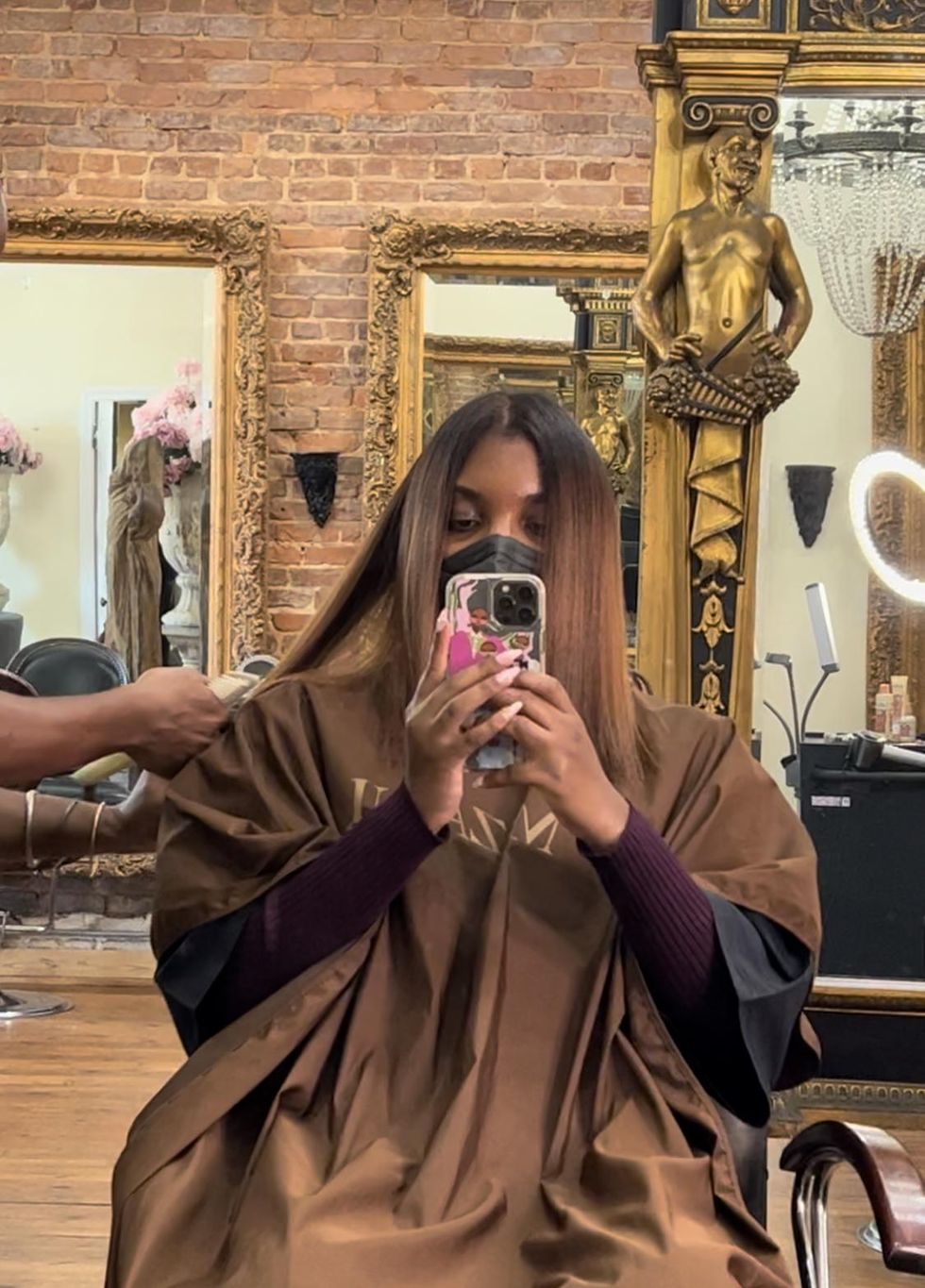
Courtesy of Bianca Lambert
The Press and Wave
I was always in a rush when I flat ironed my hair at home—flat ironing my thick hair in large chunks. One thing I noticed was how tiny the sections of hair were as Edwards moved the flat iron slowly down the lengths of my hair. After each strand of my hair was silky to the touch, it was time for a trim. A piece of the process I recommend leaving to the experts.
And after that was complete, I asked for a bump. Edwards told me no (haha!). He refused to send me out like a '90s baby with a bump that looked more like a James Brown do. Instead, he gave me loose waves that I shook like I was in the star of my own hair commercial.
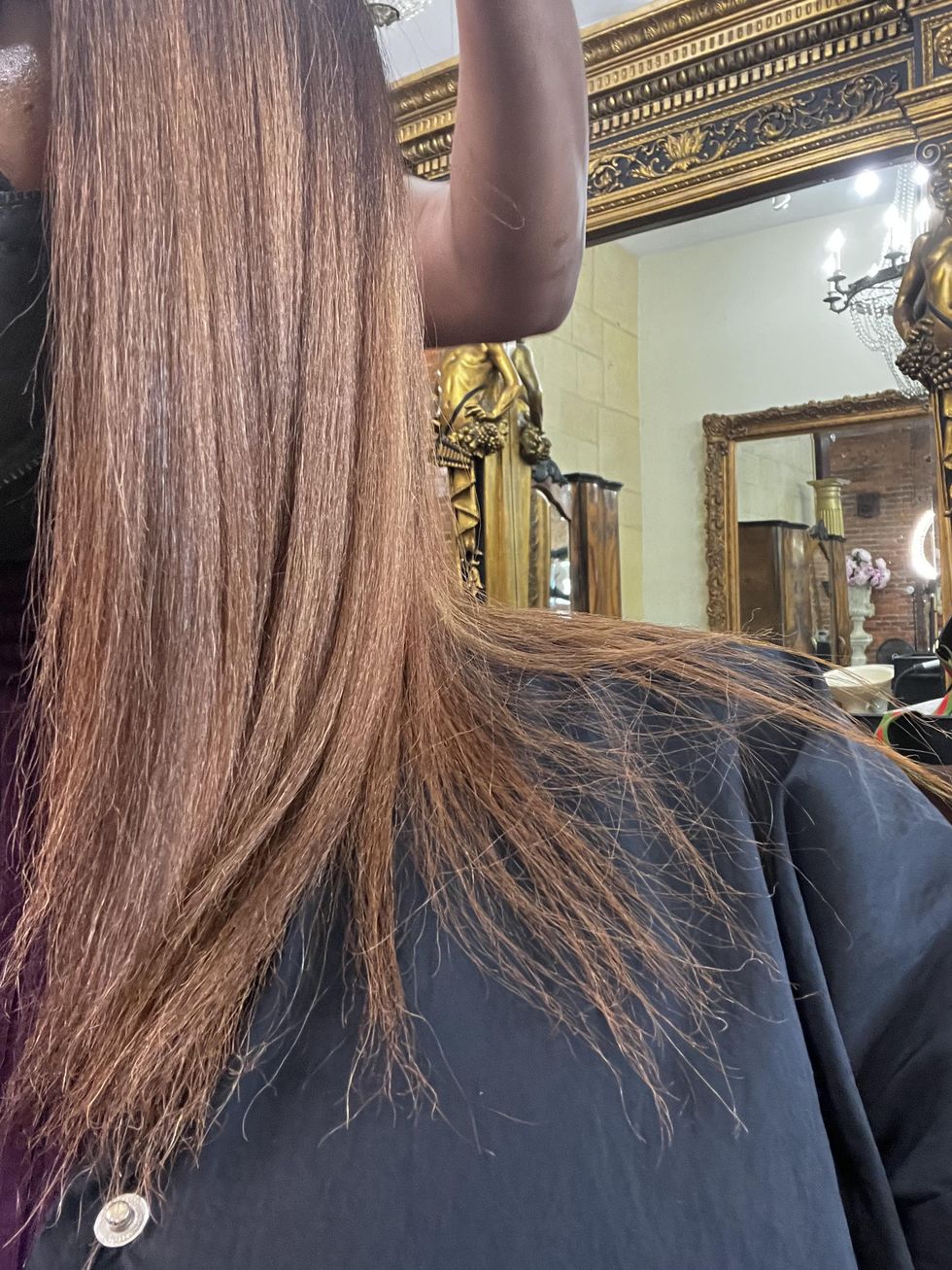
Courtesy of Bianca Lambert
Post-Silk Press Maintenance
After your silk press, there are a couple of things Edwards recommends. First things first, wrap those strands. "[Wrapping the hair at night] helps you maintain the style and moisture in your hair from root to end." He also suggests investing in a silk bonnet, head wrap, or silk pillowcase. I use both a silk bonnet and pillowcase because we all know our bonnets like to slip off in the middle of the night and go to the fridge for a drink of water.
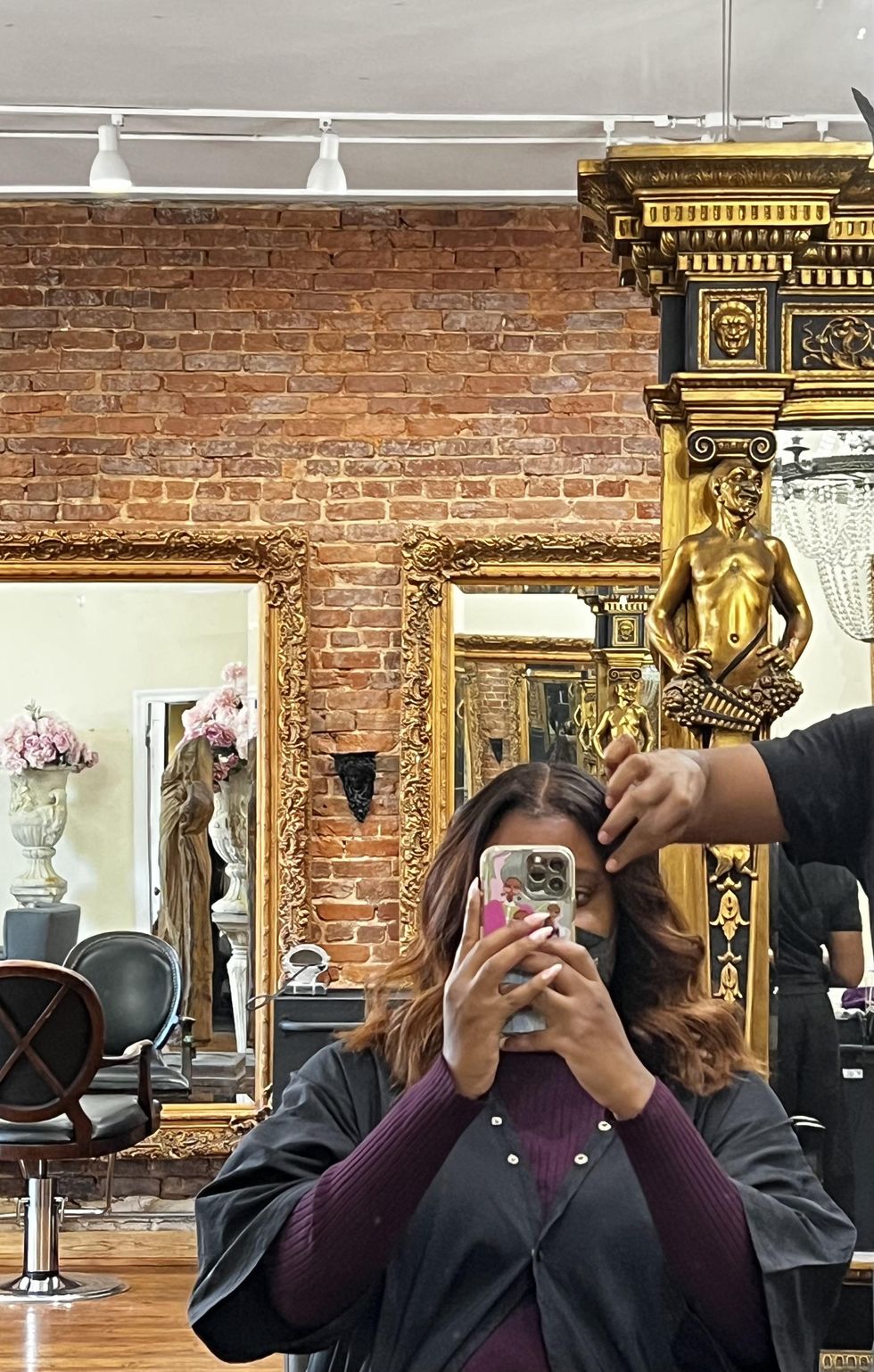
Courtesy of Bianca Lambert
Lastly, Edwards emphasizes: "Put the flat iron down." He means if you get tempted to re-lay the silkiness with more heat, don’t do it. One thing I've learned to accept with silk pressing and natural hair is gaining volume post-flat iron is just the name of the game. But, Edwards says, alternatives like silk rollers, flexi rods, or of course, wrapping your hair can help maintain your style sans adding any extra heat.
Let’s make things inbox official! Sign up for the xoNecole newsletter for love, wellness, career, and exclusive content delivered straight to your inbox.
Featured image by Bianca Lambert
Originally published on October 18, 2022





